NATO's Big Challenge: Afghanistan (LINK)
 German Army to relieve US troops in Afghanistan  Radical German Army Mandated Reduction These commitments were embodied in the Treaty on the Final Settlement with respect to Germany, or, as it is more commonly known, the Two-Plus-Four Treaty. In line with its commitments, Germany reduced its inventory of main battle tanks to 2,855, its armored infantry fighting vehicles to 2,443 units, and its artillery to 2,090 pieces. This represented the highest rate of disarmament with the exception of Russia. *German Federal Army Mandated Reductions  For years the army has been existing on a substandard basis. A large injection of finance is necessary in order to rectify these past deficits and realise the necessary investment for the future. An investment backlog of 20 billion had accumulated over recent years, i.e., roughly half the current yearly budget. Measured against gross national product, Germany spends for defense only about half that which is regarded as necessary by our European partners France and Great Britain. If there were convergence criteria for European defence and security policy similar to the criteria for participation in the European Currency Union, Germany would be left out in the cold. 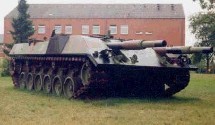 An instructive comparison. Germany's gross national product is one-third higher than the French and more that twice that of the British. If this were to be made the measure for military spending, the German defence budget would be comparable to the French and the British taken together. Germany would not only be the leading economic, but also the leading military force in Europe. A prospect not likely to be greeted with enthusiasm in Paris or London. *The German army lobbies for rearmament No nuclear, biological, or chemical weapons are in the German arms inventory. Under the Two-Plus-Four Treaty, Germany reaffirmed its renunciation of the manufacture, possession, and control of such weapons. A number of German weapons systems are nuclear-capable, but nuclear warheads and bombs remain under the control of the United States. Some Tornado aircraft have been fitted to accept nuclear bombs. 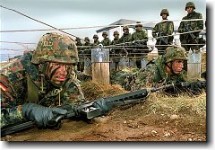 In accordance with several international commitments, recent leaks from the Ministry of Defense suggest that within this decade the German Bundeswehr (German Federal Army) shall be reduced to an active strength of 285,000 soldiers (with a mobilization volume of 500,000) *German Army Mandated Reduction The US government has recently announced plans to pull out large numbers of its 10,000 troops currently stationed in Afghanistan and redeploy them in Iraq to fight that countrys resistance movement. To fulfil this aim, Operation Enduring Freedom the official name of the US forces in Afghanistan will be merged with the International Security Assistance Force (ISAF), the NATO mission providing security services to the Kabul regime. 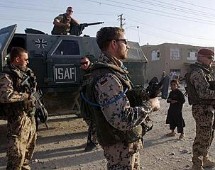 The German Army (Bundeswehr) would then take over the leadership of the Afghanistan occupation. Their presence will increase throughout the country, and they will participate in combat operations. Two thousand German troops are currently in Kabul and the northern provincial cities of Kunduz and Faisabad. 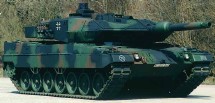 Although the merger itself still remains a contentious issue between the US and German governments, Berlin has longed signaled its readiness to provide additional relief to the US army in Afghanistan. The current opposition of the Schroeder government to the amalgamation of the two operations is intended only to throw sand in the eyes of the population. The Bundeswehr has already come to the aid of the US government in Afghanistan, when resistance to the occupation forces in the south of the country escalated last year. The UN mandate for the ISAF, which previously only covered Kabul, was quickly expanded to apply to the entire country. A few days later, preparations began for the stationing of an additional 230 Bundeswehr soldiers in Kunduz, who replaced an American contingent, freeing them to move to the south.  The German parliaments own mandate, set on October 24, 2003, to legitimise the operation, also provides for the positioning of troops in the entire country. Then, on September 30, 2004, the Bundestag, by an overwhelming majority, voted to extend the period of the occupation. Although the chancellors office still publicly rejects a merger of both operations, a spokeswoman for the foreign ministry told Der Spiegel magazine that the German government already made clear last autumn that a discussion over possible synergy effects between Operation Enduring Freedom and the ISAF mission would not be ruled out. To adequately compensate for any withdrawal of US troops in Afghanistan, an increase in German troop numbers would need to go far and beyond the 2,250 maximum set by the Bundestag. There are plenty of signals that such a step is already being prepared. The war against drugs is being used as the pretext. The cultivation of crops for the drug industry is the main source of finance for the Afghani warlords, who control large swathes of the country and finance private armies through drug money. In the war against the Taliban regime, these warlords were the most important allies of the US. As time has passed, they have come to be viewed as more of a nuisance and a threat.  In the years before the invasion of Afghanistan, the Taliban had made extensive inroads to curb the production of opium. Since the US-led occupation, the country is once again one of the leading producers of heroin in the world. Two thirds of the worlds heroin supply come from the region of Hindu Kush mountains. According to UN estimates, around half of the countrys GDP is linked to the production of drugs. The income from the drug trade is double that of foreign aid. A UN report from November of last year characterised the production of opium as the main engine of economic growth in Afghanistan.  The autocratic rule of the warlords is undermining the US puppet regime of Hamid Karzai in Kabul. The political influence of the central administration hardly extends past the city limits of the capital. At the same time, local warlords are increasingly taking up a stance of opposition to the newly established regime. Action against drug production, which Karzai has promised, would inevitably bring the danger of armed conflict with warlords who are not especially selective in their choice of allies and could join forces with still-active Taliban and Al Qaeda fighters. 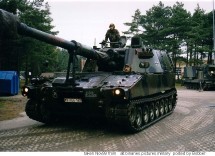 This is the reason why German soldiers have until now not been allowed to actively participate in the fight against drug production in Afghanistan. However, politicians from the conservative Christian Democratic Union (CDU) and Christian Social Union (CSU) have recently demanded that this prohibition now be lifted. Until recently, the German government rejected this proposal, stating that it had no intention of engaging German soldiers in the fight against the drug trade, but this is a position that it is now moving away from. In January, Der Spiegel reported secret service information that the US and the UK were planning a massive offensive against the drug growers in the spring. Such action would ultimately bring increased dangers for the Bundeswehr. This explains intimations from Defense Minister Peter Struck (Social Democratic Party SPD) about increasing German troop numbers in Afghanistan and the sending of special forces units (KSK) to reinforce the safety of the German contingent. As soon as these special forces are in place, it would not take long before they are actively fighting against the drug trade. The chairman of the German Army federation, Bernhard Gertz, made clear in an interview with the Neue Presse newspaper that he also envisages this task for the German soldiers.  The anticipated sending of the KSK suggests that their mission will be more than just the securing of positions. The highly armed KSK would, in line with their training, be used as local, unattached, lightning-strike attack troops. As mere patrol officers, they are completely over-qualified. KSK soldiers were already involved in ground combat together with the US Army against the Taliban and Al-Qaeda between October 2001 and February 2002. The German government tried at the time to keep the KSK participation a secret. In the end, recorded remarks by US General Tommy Franks to the Pentagon made public the KSKs participation in Afghanistan. An offensive against the drug barons would in all probability heighten the instability in the country. Experts from the CIA and the German Federal Intelligence Service (BND) were unanimous in remarks to Der Spiegel, saying that such an operation could lead to a worst-case scenario. A BND agent in Kabul was quoted by the magazine saying, the bosses of the drug business will do everything to protect their income.  The extremely unstable situation in Afghanistan could quickly develop into an out-and-out catastrophe for the German government. With this future armed engagement in mind, Defense Minister Struck has already held a roundtable with army experts to discuss how the public would react to large numbers of dead and wounded soldiers. *Germany To Deploy reconstruction Team In Afghanistan Labels: Armageddon, Bible Prophecy, Bush Brotherhood of Death  Stumble It! Stumble It! |















































Comments on "NATO's Big Challenge: Afghanistan (LINK)"
post a comment